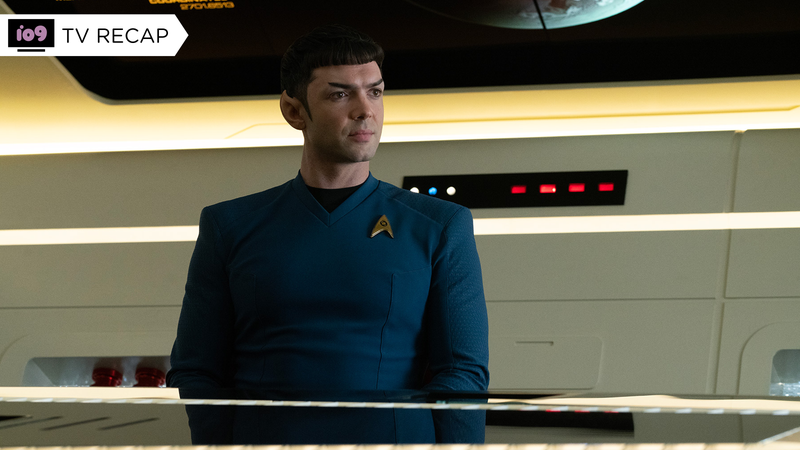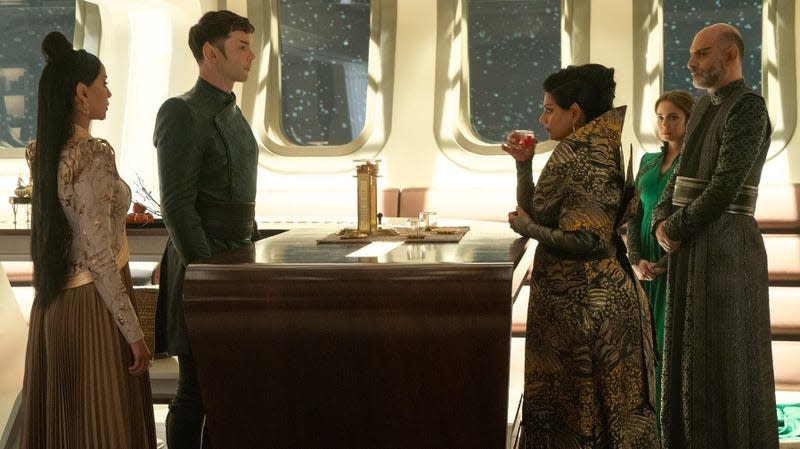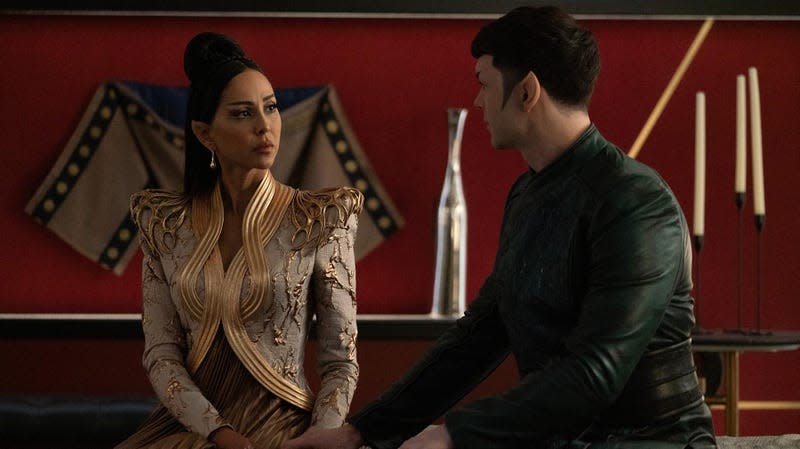On Star Trek: Strange New Worlds, Love Is the Hardest Thing

“Who is Spock?” is a question Star Trek has been fascinated with from the very beginning, and for good reason. The paradox of the half-Vulcan, half-Human science officer lets us examine the meaning of what we see as the human experience from the perspective of someone both removed from it and defined by it—and Strange New Worlds’ first proper crack at it is a poignant exploration of that experience indeed.

“Charades” opens almost with an intent to lull you into a charming sense of false security—that we are in for, as we have been more often than not when dealing with the personal life of Mr. Spock on Strange New Worlds, a bout of farce. There are chill vibes aboard the Enterprise; with no major missions and a request to investigate a planet’s ancient civilization in the Vulcan system, the crew is left on a relaxed rotation as Pike takes the spaceflight equivalent of the scenic route. And there’s comically timed tension between Spock and Nurse Chapel, inadvertently thrust together on the shuttle to investigate said civilization through circumstance. We’re primed to expect a great deal of shenanigans for the next hour, something light and breezy in Strange New Worlds’ effortless style. So when we get to the inevitable inciting incident, an accident aboard the shuttle that sees an encounter with a wormhole left behind by the aforementioned ancient civilization render Spock completely human—complete with the goofy classic that is Spock getting a “What the fu-” in as the titles hit—you are completely disarmed.
Read more
Disney now says those Snow White photos are simply "not official" [Updated]
What's on TV this week—Justified: City Primeval arrives, It's Always Sunny In Philadelphia ends
Microsoft And Sony Finally Reach Deal For The Future Of Call Of Duty On PlayStation
By bringing T’Pring directly into the mix at this moment—and crucially, having the all-too-human Spock, now funnily “disguised” with the same ear prosthetics that turn Peck into a Vulcan, back out of letting T’Pring in on the crew and Amanda’s plan to hoodwink her parents—“Charades” becomes a fascinating parallel to last season’s wonderful, and just as crucially hijinks-laden, “Spock Amok.” That episode used its body-swap comedy to ultimately tell a story about openness and understanding being crucial to T’Pring and Spock’s strained relationship, as the two began to better understand each other’s livelihoods and desires and how their love for each other ultimately transcends those hardships. Here, as the engagement dinner begins and the stakes split between a regretful Nurse Chapel racing back to the wormhole species in an attempt to help get Spock fixed before it’s too late, and Pike, Amanda, and Spock trying to hoodwink their way through the engagement dinner and the judgmental eye of T’Pril, “Charades” becomes a similar story of love, but not one that’s entirely quite so positive, and more about the messiness and worthiness of love in all its complexities.
If “Spock Amok” gave us the message of love transcending miscommunication, “Charades” reminds us that sometimes it’s capable of blinding us from things that need to be said to the people we truly love. It can be how the love of a mother can be overbearing, as T’Pril relishes in putting Spock through the wringer in front of her daughter, or how the love of a mother can hide the pain of the sacrifices made for their child—as it’s revealed to Spock through Amanda’s great lengths to get Vulcan society to accept her, instead of constantly looking down on her as a human who dared to love a Vulcan. As Chapel begs the wormhole aliens to save Spock, she almost fails to win them over because she is initially hesitant to admit she has to help him because she loves him. And although the day is saved in just the nick of time, and Spock is ultimately able to get through the engagement dinner largely unscathed (save from a few burns from a scalding hot ceremonial tea pot), his love for Amanda and T’Pring alike demands that he tell T’Pril and Sevet—and by that extension T’Pring—that their judgmental view of human capability has been defeated by a fully human Spock, and just how much their treatment of Amanda hurts him.

It’s a wonderful moment of shared understanding and pain for Amanda and Spock—an acknowledgement of the hurt she had to put herself through being ostracized on Vulcan just to give her husband and child their own happiness. But where “Charades” goes further than “Spock Amok” is that this is not the ultimate conclusion of the story, and there is indeed a price to be paid sometimes in love’s blinding light. Spock may reveal his unintentional deception because he wants to stick it to T’Pring for her behavior with Amanda and T’Pril, but what he doesn’t realize is just how unbelievably hurt T’Pring is by being left out of the crew’s deception. Sure, she doesn’t like her mother’s backwards attitude to Spock either, but his choice, even if in the moment noble, to not let her in on a plan he was willing to let the entire Enterprise crew in on rocks her to her core, and she is just as much of a victim of Spock’s deception as her parents were.
“Charades” doesn’t exactly end as a win for Spock, and that’s important. He understands his human self and the perception of that self better now, but he also understands just how much those emotions can cost him if he lets them overwhelm him, when T’Pring refuses to reconciliate and requests they spend time apart. Even if this gives Spock and Chapel the chance to reconcile their love triangle and explore the idea of a relationship together, Spock now has to navigate the remnants of a ruined betrothal and the pain he’s inflicted on someone he does truly care about too. It’s an important moment of nuance to an episode that could’ve otherwise been an enjoyable, if slightly empty romp, a spiritual sequel to a season one standout that doesn’t quite hit the same highs the second time round.

By offering this emotional complexity as the real thrust behind the hijinks, “Charades” becomes something more—and beyond it, an important bridge between Strange New Worlds’ exploration of Spock and the man we see in the original Star Trek, as well as a better understanding of the distant relationship between himself and T’Pring we come to see in the iconic “Amok Time.” Strange New Worlds has done a killer job of approaching how it can fit itself into the classic narratives of the original Trek, and “Charades” is as just a strong as an example of that as any of the more direct riffs we’ve had in the show so far.
Want more io9 news? Check out when to expect the latest Marvel, Star Wars, and Star Trek releases, what’s next for the DC Universe on film and TV, and everything you need to know about the future of Doctor Who.
More from Gizmodo
Carlee Russell Was Found Alive But Tiktok Made The Nation Care
James Marsden says Jury Duty's back-up plan was to get very, very boring
Jay Baruchel says he genuinely hated Jonah Hill while filming This Is The End
Here are three of the biggest demands striking actors are asking for
Sign up for Gizmodo's Newsletter. For the latest news, Facebook, Twitter and Instagram.

